
This article will cover each item from the headline in sequence. You may or may not be in the manufactured home community sector, but if you are in the industry, what follows directly and/or indirectly impacts you.
The first comment comes from one of several emails from a resident who is troubled by rising site fees. At some point, as the message itself indicates, she intends to do a summary which could be published for the use of others, specifically mentioning public officials. Note before beginning, she is happy with her manufactured home, but clearly not happy with the so-called predatory practices of numerous firms.
“I am overwhelmed by the information out there on manufactured housing. I had no idea and most came from your site for which I am thankful. I just read in the Private Equity Stakeholder Project that “realtors estimate that for every $100 increase in space rent, a manufactured home loses $10,000 in value” Any thought/comment on that?
Anyway, for my purpose I am going to try to summarize key points and put them into some kind of document (hopefully limited to two pages) from which local and state officials can see the need for protections not only for those living in manufactured homes, but renters as a whole, as numerous reports say wages are not keeping pace with rising rents and that most developers build high-rent housing. There was also a report that indicated in the next decade some seniors including teachers and firefighters are going to find out that they have too much income for government assistance but will not have enough for high rent housing.
Anyway, thank you again for all of the info and I am sure I will be back with additional questions.”
MHLivingNews encouraged her to dig deeper still before writing. “Measure Twice, Cut Once” – the Carpenter’s Maxim. Among the articles our publication provided her to read further was this one linked below. What follows is a new report, and the core of it is from a letter to the editor from another resident leader.
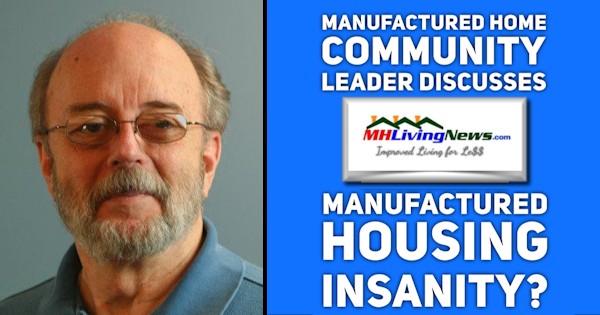
Recall the recent messages from a pair of resident leaders on each side of the nation, previously published at the link in this sentence.
That tees up the next part of the headline. There is a jockeying for position reportedly underway at and involving the Manufactured Housing Institute (MHI). Among the possible contenders? Per sources, one Mark Bowersox.
While now working ‘with’ exiting MHI President, Richard ‘Dick’ Jennison, before joining the efforts of the team who are mostly based in Arlington, Bowersox was previously known to critique Jennison’s lack of understanding of the manufactured home industry, its issues, and for a lack of effective leadership. In that critique, Bowersox is far from alone.
Later, Bowersox went to work for MHI himself as one of their vice presidents.
But before the current Arlington drama, Bowersox – while still Executive Director of the Indiana Manufactured Housing Association – said the following for publication.

As a preview and programming note, Bowersox will not be the only manufactured home professional who will discover this type of blast from their past. Now is the time to study the histories of those who vie for this MHI post.
The industry’s homeowners and much of the industry’s professionals have arguably been led down blind alleys. When they discover where they have been led, some will be both angry and motivated to do something about that anger.
Bowersox’s comment was in response to a proposal floated some years ago while our publisher was a member of MHI. The trade association did not publicly sign on in a robust way to the idea of working with residents, which begs the question, why not?
- Tim Williams of 21st Mortgage Corporation, a Berkshire Hathaway owned business,
- Tom Hodges, counsel for Clayton Homes, and currently another MHI Executive Committee member,
- and others from Berkshire owned brands where exposed to elements of that same concept to revive manufactured housing by bringing ethical companies and manufactured homeowners together to work for the mutual benefit of the industry. That occurred over an elaborate dinner in Las Vegas that Tim Williams invited MHProNews publisher L. A. ‘Tony’ Kovach to; and it was prior to Kovach’s realization of how MHI and the Berkshire brands were operating in an arguable effort to consolidate the industry into a relatively small group of hands.
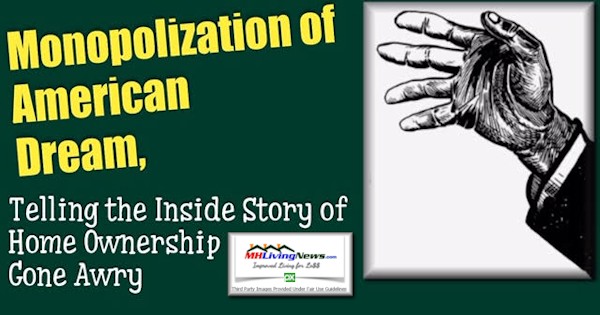
Who Will be the Next President of MHI?
The truth is, as the organization is currently structured, it doesn’t much matter, does it?
It could be Lesli Gooch, Bowersox, someone else on staff, or someone entirely new.
Whomever it will be, that person will be required to follow the guidance of the MHI Executive Committee. Rephrased, how will the be any different in performance than Dick Jennison? Sure, someone may have more charisma, but if the policies are the same, how will mere charm matter? The power at MHI is held by the executive committee.
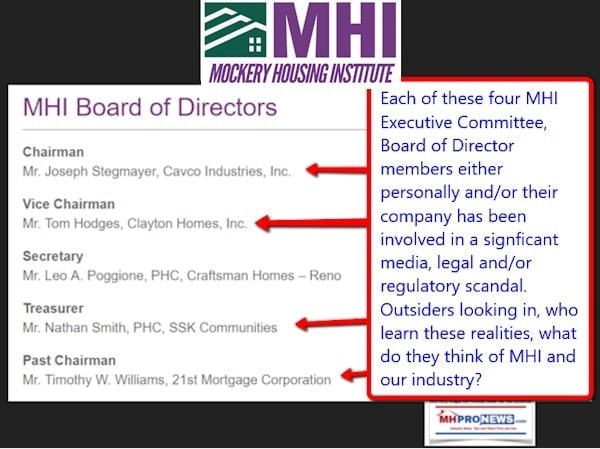
If they buck the system, they will likely find themselves sooner or later out of a job. Which is why the comments by a former MHI president linked here are of interest.
The honest independents of our industry don’t need to follow for the next round of rope-a-dope that occurred during the costly Preserving Access to Manufactured Housing Act fiasco, does it?
There are honest and ethical people associated with MHI. There are firms that may even be ‘black hat’ operations that fuel those John Oliver style reports, but still have scores of people with a conscience that are happy to provide periodic useful tips and insights to MHProNews/MHLivingNews.

The earlier report this morning is laying the foundation for further insights into the complex, often troubling world of manufactured housing industry politics.
But so too does the latest report from MHARR, which spells out that several manufactured housing state associations have been silenced or have gone over the interests of consolidators.
Which recalls the statement from former MHI VP and former MHARR president, Danny Ghorbani.
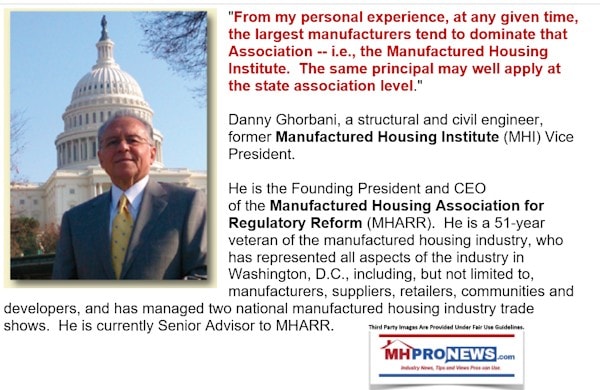
Which brings to mind the recent adage from former MHI member and award winner, Marty Lavin.
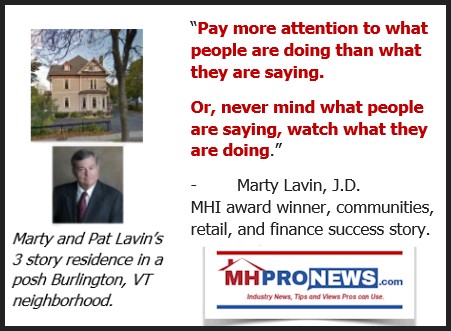
It is a tangled web, as all spider webs are. The mantra of former President Ronald Reagan comes to mind, “trust but verify.” If someone fails that test of trust, should it carelessly and unconditionally be given again?
There is already a movement underway to bring thoughtful resident leaders and white hat brands in manufactured housing together. It may well borrow some of the key thoughts advocated by Robert Van Cleef, whose following bullets could readily be embraced by thousands of manufactured home industry professionals.
Enforce good existing laws to:
- break up or otherwise fine/penalize those who purportedly have violated antitrust or other laws. Recall the ‘Case Against Clayton Homes,’ linked here. It must not be thought that they will be the only such MHI connected brand that may come under scrutiny; ICYMI, see the comments from MHI members and others that point-the-finger at MHI member problematic behavior. In fairness, MHI has lifted up their code of ethics again, but has or will it be truly enforced?
- Enforce the enhanced preemption and other aspects of the Manufactured Housing Improvement Act of 2000 (MHIA) to open up more developments and infill sites.
- Use good existing laws to modify or robustly open competitive financing options mandated by the Duty to Serve (DTS) under the Housing and Economic Recovery Act (HERA) of 2008.
- Similarly modify FHA Title I and Title II lending, VA, USDA (Rural Housing), and other federal programs to create more cost-effective market rate competition for manufactured home lending. It should be stressed that Triad Financial and Credit Human have both taken steps to encourage a full and proper implementation of DTS, even though it could cost their firms some profit. Which begs the question, why hasn’t the Berkshire Hathaway brands backed any meaningful reforms, other than their self-serving ‘new class of homes?’
Van Cleef’s arguments are well reasoned. MHProNews would concur with the thrust of them, and only questions the notion of rent control. That said, his argument for ‘temporary’ rent control until more new community sites and infill sites are made available is an interesting one. MHProNews hopes to analyze and unpack that part of Van Cleef’s thesis in the days ahead.
Industry feedback is encouraged.

There is increasing clarity on the complex politics of manufactured housing associations. Learn more about Bowersox, or other topics noted herein, in the related reports, below the byline and notices. That’s a wrap on your second episode of manufactured housing’s runaway most-read “Industry News, Tips, and Views Pros Can Use” © where “We Provide, You Decide.” © ## (News, analysis, and commentary.)

Soheyla is a managing member of LifeStyle Factory Homes, LLC, the parent company to MHProNews, and MHLivingNews.com. Connect with us on LinkedIn here and here.
Related Reports:
Click the image/text box below to access relevant, related information.
Bowersox Takes Vice President Position with Manufactured Housing Institute
“Rape, Pillage, and Murder” Reactions from Industry Professionals to Frank Rolfe Report
